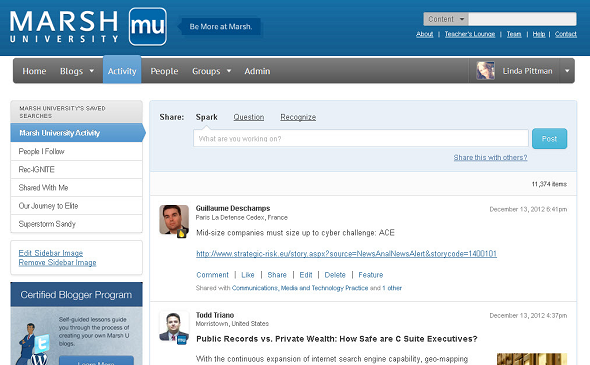Risk Management Firm Bets On Social BusinessRisk Management Firm Bets On Social Business
Marsh built the habit of sharing around its social learning environment. Now it plots the next steps for a social business strategy.


The BrainYard's 7 Social Business Leaders Of 2012
The BrainYard's 7 Social Business Leaders Of 2012 (click image for larger view and for slideshow)
When global risk and insurance services firm Marsh created a social-learning and knowledge-sharing environment for its employees, it did not necessarily build the perfect technical environment, but it came close enough, said Ben Brooks, one of the creators of Marsh University.
"The majority of the money and time my team spent was focused on change management and adoption, not the technology," Brooks said in an interview. As SVP and global director of enterprise communications and colleague engagement, Brooks championed the project in partnership with Laurie Ledford, chief human resources officer of parent company Marsh & McLennan.
When the project started in late 2009 to January 2010, the strategy wasn't necessarily explicitly a "social" one, Brooks said. "In a more conservative industry like insurance, social was not the hot thing, what everyone was doing. On the other hand, collaboration was something everyone at our firm understands." Some of the technical decisions made then are ripe to be revisited because the market for social software has matured, Brooks said. But what's more important is that the organization is ready to take advantage of them, he said.
"Three years ago, the conversation was more around if we should do social media. 'Do we need this?' The conversation now is how to do it. Meanwhile, we've built the muscle memory of our colleagues to share online, which is a huge organizational development and behavioral change. We've already upgraded a number of things in the IT environment. But the point is, regardless of whatever technology we might choose for a better user experience, we're now ready for what the market has," Brooks said.
The social business payoff doesn't necessarily show up in one neat return on investment number, but corporate initiatives that take advantage of the social environment consistently prove to be more successful than those that do not, he said. Participation is also climbing. This year, Marsh saw a 300% increase in the number of employees coming to the site on a daily basis.
[ Looking for something? Read Social Media Search: How To Find It.]
In some cases, social sharing is credited with helping Marsh win new business, Brooks said. "In one case, we had a client in Turkey that had a risk, but the markets we typically use for risk in London were essentially saturated." The frustrated broker aired his dilemma on the internal social network and connected with a colleague who asked, "'Have you tried the Hamburg market?' As a result, we ended up working a deal we otherwise wouldn't have been able to execute," he said.
Creating the opportunity for people to share ideas their colleagues might not have considered is a fundamental part of the value of a corporate social network, Brooks said. "With 25,000 people, you have to get them to introduce themselves to each other -- it's a way of making a big company feel like a much smaller place."
Marsh University has been cited recently in a post on the Software Advice blog (thanks to that blog's Kyle Lagunas for the introduction) and an HR Executive cover story. Marsh was also recognized in the 2011 information 500, partly because of the Marsh University project.
Marsh University is not really a "university" or even a formal online learning environment but a social tool designed for knowledge sharing and communications. The name "Marsh University" is one Brooks inherited from a corporate strategy exercise aimed at reinvigorating the organization, conducted before he was put in charge of the project. As part of a corporate strategy initiative known as Ignite, Marsh established several goals and "one of them was to create a, quote unquote, 'Marsh University' -- even though no one knew what that meant," Brooks said. "Our challenge was to figure out what we could do creatively with a fairly modest investment of resources. Everything had to be funded from internal savings."

Marsh University and its Spark microblogging tool.
Rather than building on an enterprise social networking suite, Marsh partnered with a startup, Red Rover, that helped cobble together a solution including components like WordPress blogging software, Box file sharing, Kaltura for corporate video sharing, and Red Rover's own software for microblogging, member profiles and group discussions. Microblog posts are known as Sparks on Marsh University, a reference to the Ignite strategy for corporate culture. Long term, Marsh is likely to look to get out of the business of developing software if it can find a platform that meets its needs, Brooks said. However, over the past few years this approach worked well, with Red Rover taking an agile software development approach, hosting software and making sure that Marsh University stayed current with upgrades to the components of its platform, such as WordPress.
"It was great for us to be able to ride the wave of an ecosystem like the one around WordPress," Brooks said. "I would always keep an eye on Chatter and Yammer and Jive, and we sometimes were ahead of where they were. Oftentimes whatever they were describing was something we already had, sometimes with a more simple way of expressing it. Now, a lot of that technology has caught up. Marsh is not a software company, so we're evaluating whether there is an opportunity for us to stay current with social technology using one of these platforms."
Marsh is also interested in the concept of providing a common "social layer" that integrates with multiple enterprise applications, Brooks said. Other next steps include:
-- Exposing Marsh University (or a subset of it) to potential new hires. "We're thinking 'how could we engage in them peek of what the company is like and get them to understand our role in the world of commerce, our position in our industry,'" Brooks said. The company already provides a public landing page that articulates some of Marsh's social business bragging rights.
-- Inviting participation from insurance carriers for social collaboration on the supply end of Marsh's business.
-- Social collaboration with clients.
The last of these would be the most compelling, Brooks said. "I haven't seen too many companies crack the use of social for B-to-B, but everyone seems to be talking about it." Some clients do business with Marsh in 30 or 40 countries, "where the footprint or maturity of the business in each country might be different," so the collaboration challenge would be great but so would the potential payoff, he said.
Follow David F. Carr on Twitter @davidfcarr or Google+. The BrainYard is @thebyard and facebook.com/thebyard
Social media make the customer more powerful than ever. Here's how to listen and react. Also in the new, all-digital The Customer Really Comes First issue of The BrainYard: The right tools can help smooth over the rough edges in your social business architecture. (Free registration required.)
About the Author
You May Also Like






